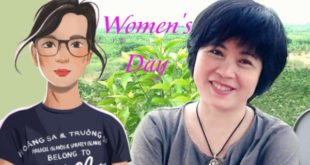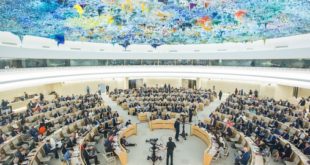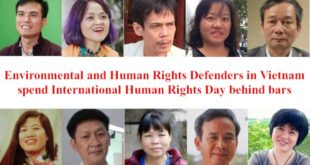
WASHINGTON D.C. 20 September 2016 (VCHR) – The Vietnam Committee on Human Rights (VCHR) and the Hudson Institute held a conference on “Religious Freedom in Vietnam: Its Importance for Regional and Global Security” on 12 September 2016 at the Institute’s Stern Policy Center in Washington D.C. The conference brought together diplomats, academia, religious freedom experts, activists, lawyers, journalists and victims of religious persecution from religious communities including the Unified Buddhist Church of Vietnam, Hmong and Montagnards Christians and Khmer Krom Buddhists from all over the USA, Canada and Europe.
Keynote speakers included former U.S. Assistant Secretary of State for Human Rights
Elliott Abrams, Commissioner Kristina Arriaga of the U.S. Commission on International Religious Freedom (USCIRF), Nina Shea, Director of the Hudson Institute’s Center for Religious Freedom and Võ Văn Ái, President of the VCHR.
Violations of freedom of religion or belief were described in detail by experts and victims of religious persecution, including Võ Trần Nhật on the Unified Buddhist Church of Vietnam (UBCV), Venerable Kim Muol, Khmer Krom Buddhist monk and former political prisoner, Prak Sereivuth, Vice-President of the Khmer Kampuchea Krom Federation, Tong C. Vang, Director of the South East Asia Monitor for Justice and Human Rights and religious freedom advocate for the Hmong people, and Sara Colm, expert on human rights issues in Vietnam and Cambodia, who spoke on the plight of Christian Montagnards.
At a time when the U.S. is about to elect a new administration, participants agreed that the conference marked a crucial moment for religious freedom in Vietnam. “This is an extremely timely event because the relationship between Vietnam and the United States is becoming closer, and also because within a month or so Vietnam will be adopting a new Law on Belief and Religion”, said Nina Shea.
In May this year, U.S-Vietnam relations grew closer after President Obama lifted the U.S. arms embargo during his visit to Vietnam. The European Union is also strengthening ties with Vietnam, with the recent conclusion of a bilateral Free Trade Agreement. However, as several speakers at the Conference noted, improved relations should not give Hanoi’s communist regime a blank check to violate religious freedom and human rights.
In his opening remarks, VCHR President Võ Văn Ái noted that Western democracies and Vietnam were moving in completely opposite directions concerning religious freedom. Whereas the U.S. passed the International Religious Freedom Act in 1998 and the EU has adopted Guidelines on Freedom of Religion of Belief (2013) and appointed Mr. Ján Figel as Special Envoy on FoRB outside the EU this year, Vietnam is seeking to use the law “to prevent, rather than protect this right”. Indeed, Vietnam’s National Assembly is about to adopt a highly controversial Law on Belief and Religion “which will legalize intrusive state interference into religious affairs and impose a draconian system of registration and control”, said Võ Văn Ái.
Elliott Abrams, former Assistant Secretary of State for Human Rights and former Deputy National Security Adviser stressed the fundamental importance of religious freedom: “A regime that does not permit freedom of thought and belief and worship is one that sees the inhabitants of the country not as citizens, but as suppliers of labor—to use the old term, as a proletariat. It sees them as cogs in the machinery, as automatons whose job is to work, to rally when assembled, and to shout praise of the regime when required. Thought—free thought, freedom of conscience, freedom of religion—would get in the way of all that. In communist systems, individuals have no rights; only the Party has rights”.
The U.S. should help Vietnam develop into a stable society that could be a long-term American ally, he said. “We should be urging the regime to stop fearing its own people, to stop acting as if their civic activity is always a threat. We should be urging the Vietnamese regime that it can develop a more harmonious society if they allow the people more freedom of religion. And we should be arguing that the only way for it to acquire the moral authority and legitimacy it seeks is to allow the people of Vietnam more freedom”.
Kristina Arriaga de Bucholz, Executive Director of the Becket Fund for Religious Liberty and Commissioner of the US Commission on International Religious Freedom, stressed that pressure for improvements could only be efficient if the U.S. government made it clear that relations were conditional on progress in religious freedom. ”We are at a unique moment of inflexion, because we are changing our administration. We must put pressure on the new administration, and they in turn must put pressure on Vietnam. They must tell Vietnam that if it wants to be fully integrated into the world community, it must treat religious freedom as a right, not as a gift by the state. Rights do not belong to governments, so governments can neither give them nor take them away”.
The daughter of a Cuban dissident of the Castro regime, Ms. Arriaga said it was vital to “name names” at every opportunity and press for the release of all those detained for their religious beliefs. Amongst others, she cited Thích Quảng Độ, leader of the Unified Buddhist Church of Vietnam, Pastor Nguyễn Công Chính, Protestant human rights lawyer Nguyễn Văn Đài, Catholic blogger Nguyễn Hữu Vinh etc… “It is inexcusable that any US official should visit countries like Vietnam, China and my own country Cuba, and fail to name names”. She concluded: “the stark reality is that from the standpoint of international religious freedom, Vietnam does not live up to its commitments. This Conference deals with what we can do in the future. We must begin by demanding that the US designate Vietnam as a Country of Particular Concern (CPC)”, she said, referring to the U.S. blacklist of the world’s worst violators of religious freedom.
Tina Mufford, Senior policy analyst and Vietnam specialist at USCIRF agreed that, unless there was a “sea change” in its religious policies, USCIRF would continue to designate Vietnam as a Country of Particular Concern (CPC) as it had done for the past 16 years. Ms. Mufford said that the main problem with the upcoming law on belief and religion was the government’s “whole attitude and its need to have a tight control over religions. There is no reason for that, no excuse for that, but that is what the new law, in its current form, represents”. USCIRF, she said, “would like to see Vietnam leave unregistered groups alone” and give legal recognition “to those who just don’t want to be associated with the government. They aren’t working against [the government], they just want to be independent. That would be our advice to the government of Vietnam as they move forward on the law on religion”.
Võ Trần Nhật, VCHR Executive Secretary, described government repression against the Unified Buddhist Church of Vietnam (UBCV). The UBCV is victim of “stealth repression”, he said, which consists of daily harassments, isolation, surveillance, house arrest and intimidation, with Buddhists being threatened with losing their jobs or seeing their children expelled from school if they attend UBCV pagodas. The new Law on Belief and Religion is a “trap” for religions, he said. “Non-registered organizations are not allowed to practice religion. There is no religious freedom for them. Religious groups which agree to be registered have to accept the total control of the Communist Party over their organization, their activities, the content of their teachings, their leadership and membership. There is no religious freedom for them either”.
The conference concluded with a 2-hour roundtable session on best practices for inter-faith coalition building to promote and protect freedom of religion or belief in Vietnam Southeast Asia.
This post is also available in: French Vietnamese
 Quê Me Quê Me: Action for democracy in Vietnam & Vietnam Committee on Human Rights
Quê Me Quê Me: Action for democracy in Vietnam & Vietnam Committee on Human Rights




